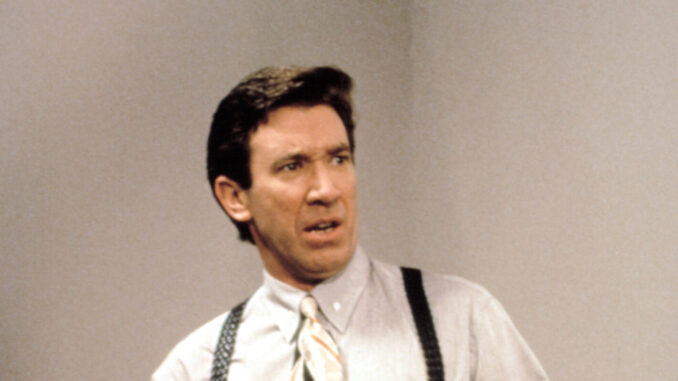
The Final Curtain Call: Why "Home Improvement's" End Was More Than Just "Tool Time" Passing
For eight seasons, the comforting thrum of power tools and the booming grunts of Tim "The Tool Man" Taylor resonated through living rooms across America. Home Improvement wasn't just a sitcom; it was a cultural touchstone, a warm blanket of family antics, relatable mishaps, and surprisingly poignant life lessons delivered by a man obsessed with "more power." So, when the final episode, "Backstage Pass," aired on May 25, 1999, it wasn't just another show ending. It was a fond farewell to an era, a deliberate, meta-narrative conclusion that perfectly captured the show's essence while simultaneously explaining, with a knowing wink, why it was time for the beloved Binford-fueled household to power down for good.
What went down in that final hour was less a traditional plot-driven narrative and more a heartfelt retrospective. Home Improvement had always broken the fourth wall with Tim's direct addresses to the audience and the occasional peek behind the "Tool Time" set. "Backstage Pass" fully embraced this meta-approach, presenting itself as a "behind-the-scenes" special. Hosted by Tim and Al themselves, the episode showcased a montage of clips from the show's most memorable moments, bloopers, character interviews (some in character, some breaking), and even a glimpse of the cast and crew sharing their genuine affection for the series. This format was a stroke of genius, allowing the show to celebrate its own legacy, acknowledge its loyal audience, and provide a sense of shared nostalgia that a simple final plotline might not have achieved.
However, beneath the clips and comedic patter, a more substantial emotional ending was unfolding. The in-universe reason for the show's conclusion was Jill Taylor's acceptance into a doctoral program in Michigan, necessitating the family's move out of their iconic, ever-renovated home. This premise provided the emotional core for the final moments. We saw the familiar Taylor house, a character in itself, being dismantled piece by piece. The vibrant, lived-in chaos of the set slowly gave way to an empty shell, a powerful visual metaphor for the impending end. The "Tool Time" set, too, was stripped bare, with Al affectionately clutching his flannel, and Tim reflecting on their unparalleled partnership. These were not just set pieces; they were the very fabric of the show's identity, and watching them vanish evoked a genuine lump in the throat for long-time viewers.
The true emotional crescendo came in the quiet, reflective moments between the characters. Tim's final conversation with Wilson, the ever-wise neighbor hidden behind the fence, offered a profound and comforting goodbye, emphasizing the enduring bond of friendship and mentorship that transcended the sitcom format. The interactions between Tim and Jill were particularly poignant, highlighting their journey from squabbling newlyweds to a deeply supportive and understanding couple. Even the boys, Brad, Randy, and Mark, each received their own moment of familial closure, reflecting their growth from awkward adolescents to young men. The final shot, an empty, silent stage where the vibrant chaos of the Taylor family once resided, lingered as a powerful image of departure and the indelible mark left behind.
But why was it the end? Beyond the narrative device of Jill's career opportunity, the reasons for Home Improvement's conclusion were manifold and, frankly, quite common for long-running sitcoms of its caliber. Primarily, it was a mutual decision by the cast and network to end on a high note rather than slowly fade into obscurity. Eight seasons is an impressive run for any show, particularly one with such a demanding production schedule.
One major factor was the desire of its lead, Tim Allen, to explore new creative avenues. Having successfully leveraged the show's popularity into a burgeoning film career (most notably with the Toy Story and The Santa Clause franchises), Allen was ready to move beyond the confines of weekly television. Similarly, Patricia Richardson, who played Jill, had expressed a desire for a break from the rigorous demands of a network sitcom. The show's young actors were also coming of age, with Randy (Jonathan Taylor Thomas) having already left the show earlier in the final season to pursue academics and other interests, a significant blow to the family dynamic.
Furthermore, there's the inevitable creative exhaustion that sets in after hundreds of episodes. How many more "Tool Time" mishaps could there be? How many more life lessons could Wilson impart? While the show consistently delivered laughs and heart, maintaining freshness and avoiding stagnation becomes increasingly difficult. Ending the show allowed it to retain its integrity, cementing its place in television history as a beloved, high-quality production that knew when to bow out gracefully. It avoided the pitfall of many long-running series that overstay their welcome, becoming parodies of themselves or losing their core audience.
In the end, "Backstage Pass" was more than just a finale; it was a thoughtful, self-aware eulogy delivered by the show itself. It acknowledged the impending departure, celebrated the journey, and offered closure both in-universe and for the millions of viewers who had grown up with the Taylors. Home Improvement concluded not because it failed, but because it succeeded profoundly, leaving behind a legacy of laughter, warmth, and, of course, "more power" than any one family could possibly contain. It was, quite simply, time to put away the tools.